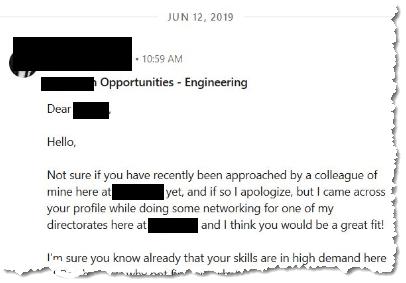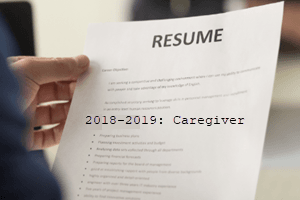In the January 28, 2020 Ask The Headhunter Newsletter 20 recruiters contact a reader — from just one company.
Question
20 HR recruiters from one [big-name defense contractor] contacted me via LinkedIn during 2019. One of them contacted me twice in two weeks, with the exact same message: Send me your most recent resume. She clearly didn’t know she had contacted me already. Others used the same message. I never heard from 19 of them again.
With recruiter #20, I blew back and told him [the company’s] recruiters are burning their reputation with me. He called, said he was impressed with my experience, that he’d get back after circulating my resume, and never did. I sent a brief “Hello?” on the LinkedIn message thread he started. I got no response.
Is this HR “ghosting” new? I recognized years back that most employers aren’t sending even automated responses to online applicants, but I never expected they’d drop the ball when they initiate the contact! I’d appreciate any theories you have on why this is occurring.
Nick’s Reply
Ghosting by HR is nothing new. Now, do you want to save 95% of your time that phony recruiters waste?
Recruiting or advertising?
20 different people contacting you from that defense contractor are not recruiting you. They are advertising. They know nothing about the jobs they’re advertising and nothing about the people they are soliciting. Sending out job spam through LinkedIn is not recruiting.
A real recruiter knows all about you before they contact you. They already know that you’re a pretty good fit for the job. They court and pursue you — you’ll be able to tell instantly. A phony recruiter turns the knobs on the LinkedIn machine and sends a bunch of job descriptions to thousands of people and tells you all to apply for them. Welcome to automated, phony recruiting.
HR: High tech, no metrics
As long as Human Resources can maintain an image of being high-tech, the board of directors at companies like this one gratefully relinquishes the icky task of recruiting to HR.
HR shovels billions of dollars into “HR technology” — automated job sites and keyword-based Applicant Tracking Systems (ATSes). These are nothing more than keyword crunchers and spam generators that unskilled keyboard punchers can operate. It doesn’t matter that the HR tech doesn’t really work, or that HR is failing miserably at hiring, because there are virtually no meaningful metrics in HR departments. (Check this Harvard Business Review report: Employers are hiring all wrong.)
Likewise, because there are no meaningful metrics, a “recruiter” at this company doesn’t know that 19 others already contacted you.
You ask why this is occurring. Why doesn’t the C-suite or the board of directors take notice?
Recruiters pass the buck
Every top executive reads the same news every day: There’s a “talent shortage” and a “skills shortage!” It’s become impossible to find good people! Never mind that employers have access to every resume, every person on the planet.
This “news” exculpates HR — so HR can plausibly deny accountability. When HR fails to fill jobs, someone and something else are to blame: schools, the labor market, unskilled workers, the economy.
Why, it’s right there in the business media!
This leaves HR free to buy and deploy even more HR technology, to outsource recruiting to boiler-rooms of telemarketers and spammers, to pass the buck, and to wash its hands of frustrated people like you. The board of directors doesn’t bat an eyelash.
What can you do?
What good does my explanation (or my rant) do you? Understanding that most “recruiters” don’t recruit is the first step toward fixing this broken employment system.
You have already wasted hours of time fielding, responding to, and fretting over phony “recruiting” contacts. I get it — you’re concerned that one of them might be a real opportunity (even though you’re 0 for 20). There’s a way to handle automated recruiting advertising and seemingly legit solicitations. Respond with an automated reply of your own.
Ask the recruiter what specific job they think “you would be a great fit” for, the salary, and the name and contact information of the hiring manager. If you’re really being recruited — rather than advertised to — the recruiter will call you (or request your phone number) immediately for fear of losing “a great fit.” Phony recruiters won’t bother.
6 hoops for recruiters
But there’s another way to test any recruiter before you go to the trouble to respond. Ask yourself these six questions about the solicitation and, if you like, ask the “recruiter,” too:
- Is this solicitation really addressed to me personally, or is it boilerplate that was mass-mailed to a list?
- Am I being recruited for a specific position, or is this an advertisement inviting me to read a bunch of job postings?
- Is there any evidence that the “recruiter” knows enough about me to know whether I’m really “a great fit” for this job?
- Did the “recruiter” mention the name of someone that recommended me, or am I just one of 14,000 matching profiles turned up by an algorithm?
- Does the “recruiter” reveal that they understand what this job is about?
- If I’m really the “great fit” they say I am, why isn’t this a request for an in-person job interview?
A good job candidate is worth a lot to a real recruiter, who will take your questions seriously. If you don’t get good answers to those six questions, you’re not being recruited. 95% or more of solicitations are not from real recruiters. They’re from job spammers paid to force feed you job postings. Beware what you swallow.
Make recruiters jump through hoops
The bottom line is, those 20 “recruiters” that contacted you are actually bots deployed by inept personnel jockeys who work for executives and boards of directors that believe what they read online and hear on the radio – that Indeed and ZipRecruiter and LinkedIn have figured it all out.
“HR says we don’t have to waste money on skilled recruiters because LinkedIn does all the hard work! Let’s buy more HR technology!”
You know better. You just need to trust your judgment. If the employer contacts you then drops the ball, don’t pick it up — certainly not 20 times! Don’t get hurt by a broken system. Do something smarter. Learn how to vet those solicitations. 95% of them are not pursuing you. They’re advertising jobs to you. Make recruiters jump through hoops before you give them your valuable time.
Invest your time talking only to real recruiters, real employers and real hiring managers that are ready to talk to you about real jobs. If only HR were to invest those billions in hiring real recruiters.
Which of the six hoops do you rely on to test recruiters? What other hoops do you make recruiters jump through — before you’ll jump through any hoops for them?
: :





 Dr. Robert Cialdini: The Psychology Powering Influence and Persuasion
Dr. Robert Cialdini: The Psychology Powering Influence and Persuasion
 In your previous postings, you suggest that LinkedIn is a poor medium for applying to companies. (See
In your previous postings, you suggest that LinkedIn is a poor medium for applying to companies. (See 


 I have a year to go until I graduate from college. I’m not the best student, but I do pretty well. I’m here to learn, but there is a lot more to college and I take advantage of it. But now I’m a little worried. My grades could be better. I could spend a little less time at the pub, and more on academics. However, homework seems like a redundancy to me. I learn in lectures, in section classes and in assigned readings. Don’t misunderstand, I crank out the papers and I get ready for tests. But doing homework? It has nothing to do with preparing you for the real world. Even people who work long hours leave the office behind at the end of the day.
I have a year to go until I graduate from college. I’m not the best student, but I do pretty well. I’m here to learn, but there is a lot more to college and I take advantage of it. But now I’m a little worried. My grades could be better. I could spend a little less time at the pub, and more on academics. However, homework seems like a redundancy to me. I learn in lectures, in section classes and in assigned readings. Don’t misunderstand, I crank out the papers and I get ready for tests. But doing homework? It has nothing to do with preparing you for the real world. Even people who work long hours leave the office behind at the end of the day.



